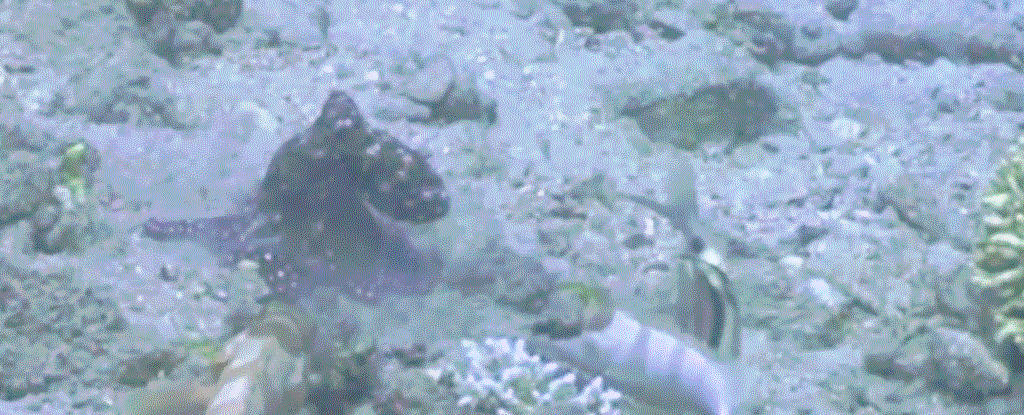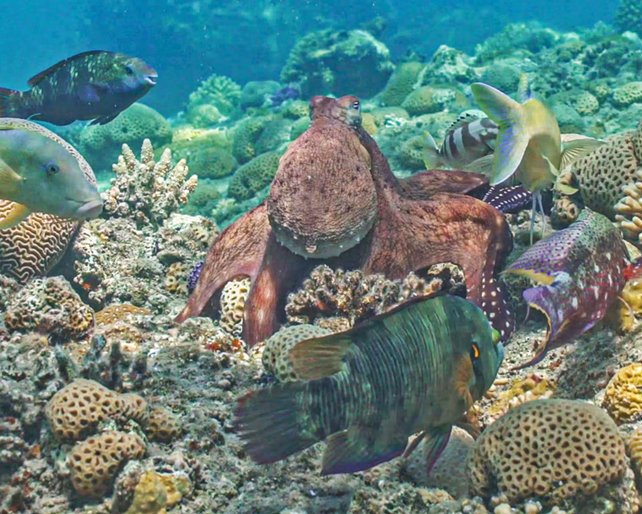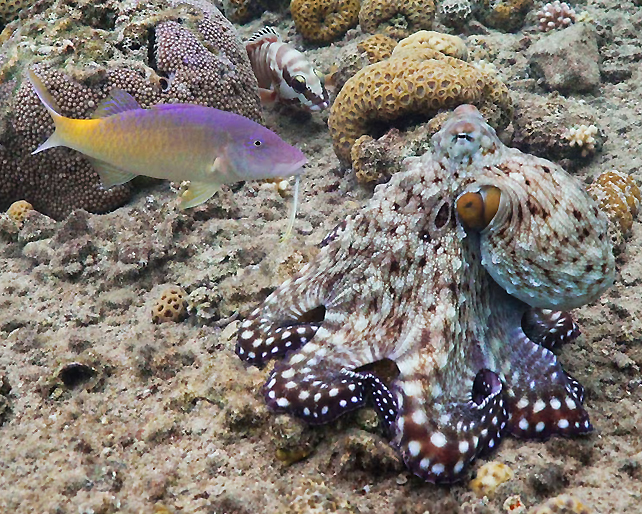ARTICLE AD
 Octopus disciplines a blackfin grouper. (Eduardo Sampaio)
Octopus disciplines a blackfin grouper. (Eduardo Sampaio)
It turns out solitary octopuses actually like to partake in multi-species hunting parties. They join fish on their revels and have even been caught disciplining unruly hunting companions with a sly punch.
As octopuses are not known to often seek the company of others of their own kind, their astounding intelligence, a behavioral trait usually associated with being social, has long been a puzzle.
Now, a new study provides another striking example of their remarkable intelligence.
Tracking 13 mixed-species hunting groups, Max Planck Institute behavioral ecologist Eduardo Sampaio and colleagues found a surprising level of sophistication in the way octopuses and fish hunt together in groups.
 An octopus hunting with a blue goatfish, while a blacktip grouper lies in wait. (Eduardo Sampaio)
An octopus hunting with a blue goatfish, while a blacktip grouper lies in wait. (Eduardo Sampaio)Analyzing footage from 120 hours of diving revealed different species contributed unique skills to the interspecies hunting party. The fish, such as the goatfish (Mullidae), perform the search, leading the group to areas of interest. But the big blue octopus (Octopus cyanea) determined when the hunt was on.
"The octopus basically works as the decider of the group," Sampaio told Helena Kudiabor at Nature News. "There's a sign that some cognition is occurring here, for sure."
frameborder="0″ allow="accelerometer; autoplay; clipboard-write; encrypted-media; gyroscope; picture-in-picture; web-share" referrerpolicy="strict-origin-when-cross-origin" allowfullscreen>
Some of these species are separated by over 550 million years of evolution, yet they can still organize and cooperate towards a mutual benefit. Both octopuses and fish increase their catch rates of crustaceans, fish, and molluscs as a result, the researchers determined using field experiments.
"One item of prey is not divided, it is taken by whoever catches the prey first!" explains Sampaio. "However, because the interaction between the fish and octopus repeat several times during a hunt, prey is 'shared' in the sense that sometimes the octopus catches the prey, and other times fish catch the prey."
Patrolling fish alert the octopus to the presence of prey, saving the cephalopod search time. When the octopus investigates crevices inaccessible to its teammates, the prey is sometimes flushed out to the waiting fish.
"This beneficial interaction enables fish to acquire otherwise unreachable prey," says Sampaio. It allows "octopuses to conserve energy by focusing on high-quality food sources, while exerting control and providing feedback within the group, highlighting the sophisticated dynamics of marine life collaboration."
Given both the octopus and their main hunting partners are territorial, it's likely the same individuals are often joining forces, though it's difficult to tell these creatures apart.
 An octopus with one of its colorful teammates. (Eduardo Sampaio/Simon Gingins)
An octopus with one of its colorful teammates. (Eduardo Sampaio/Simon Gingins)While there are other examples of mixed species hunting or foraging systems, including a mix of bird species, badger cooperating with coyotes, and groupers allying with moray eels, none of these non-human examples are known to directly correct each other's behavior.
The new footage however reveals an octopus punching at fish that get out of line. This aggression was often directed at blacktip grouper (Epinephelus fasciatus). Sounds as if they earned it, though, as the groupers tended not to contribute much to the group and instead loitered opportunistically nearby to exploit the work of the rest of the team.
"The [octopuses'] exhibited range of partner-dependent behavioral flexibility, especially concerning the use of social information when deciding to switch foraging strategies and whom and when to punch, indicates that day octopuses have hallmarks of (heterospecific) social competence and cognition," the researchers write in their paper.
This is just one of many ways octopuses pay attention to other species around them, which may contribute to their unusually keen intelligence.
"These results broaden our understanding of leadership and sociality, emphasizing the complexity and adaptability of social interactions in nature," Sampaio concludes.
This research was published in Nature Ecology & Evolution.

 2 months ago
15
2 months ago
15 

